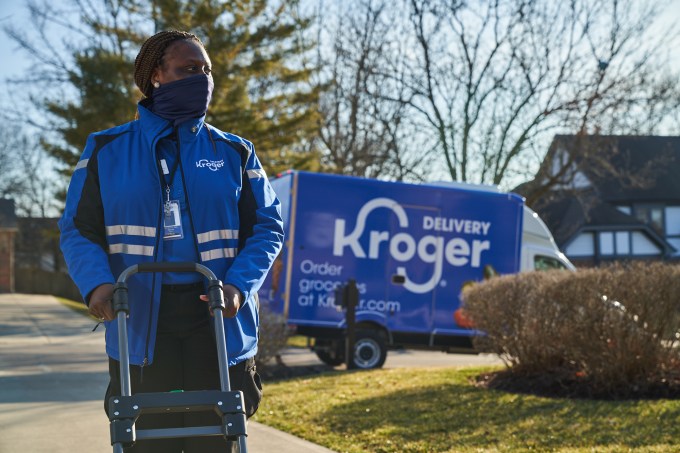After inking a deal to work together almost three years ago, U.S. supermarket chain Kroger and U.K. online grocer Ocado today took the wraps off the first major product of that deal. Kroger has launched a new Ocado-powered customer fulfillment center in Monroe, Ohio, outside of Cincinnati, a gigantic warehouse covering 375,000 square feet and thousands of products for packing and delivering Kroger orders from online shoppers.
Built with a giant grid along the floor, “the shed”, as Ocado calls its warehouses, will feature some 1,000 robots alongside 400 human employees to pick, sort and move items. It is expected to process as much as $700 million in sales annually, the sales of 20 brick-and-mortar stores.
Those orders, in turn, will be delivered in temperature-controlled Kroger Delivery vans, built on the model of Ocado’s vans in the U.S. and able to store up to 20 orders. These will also be run using Ocado software, mapping algorithms to optimize deliveries along the fastest and most fuel-efficient routes.

Kroger and Ocado’s partnership was a long time in the making, but the focus on what has come out of it is probably at its keenest right now, given the huge boost online shopping has had in the past year. The COVID-19 pandemic, and the resulting push for more social distancing, has driven a lot of people to the internet to shop, opting for deliveries over physical store visits for some or all of their food and other weekly essentials.
That trend has also spelled more competition in the space, too: the likes of Amazon, Walmart, other traditional grocers getting their digital strategies in order and online players all are hoping for a piece of the market of consumers now ready to buy online.
That tide has also lifted Kroger’s boat. In a call today with journalists, Rodney McMullen, Kroger’s chairman and CEO, said that delivery had grown 150% for Kroger last year.
While some of that may well melt back into physical shopping as and when COVID-19 cases wane (fingers crossed), many in the industry believe that the genie has been let out of the bottle, so to speak: Many consumers introduced to shopping online will stay, at least in part, and so this is about building infrastructure to meet that new demand.
(And there is some data that backs that up: Ocado CEO and co-founder Tim Steiner noted that at Ocado, pre-pandemic the average order value for the company was £105 ($144). That grew to £180 last year, and is now at £120.)
Kroger, like many brick-and-mortar players, has been building out multiple fronts in its digital strategy. Alongside Ocado, the company has also been investing in technology to boost the efficiency of its in-store operations (for example, by working with companies like Shelf Engine), and it has a grocery delivery partnership with Instacart.
Kroger’s partnership with Instacart will remain in place, not least because it covers a much wider geography than the Ocado approach, which is live now in Cincinnati, and sounds like it will also expand to Florida. While Kroger today said that CFCs will vary in size and be built on the concept of “modules” (the Monroe facility is built on seven modules), this is still a capital intensive approach compared to the Instacart model, so might overall face a slower rollout and perhaps only make sense in Kroger’s denser markets.
“The two partnerships are critical to Kroger and our customers,” said Yael Cosset, Kroger’s CIO, in the call today. “We expect to work very closely in strategic partnership with Instacart and with Ocado.”
Ocado, an early player that started out in the U.K. back in 2000, is seen by many as the industry standard for how to build and run an online-only grocery business.
Where top VCs are investing in manufacturing and warehouse robotics
But rather than growing by taking its direct grocery business outside the U.K., the company has been expanding its reach by way of using the technology that it has built for itself and turning it into a product — a process that is still very much in development, with the company working now on robotic pickers and other autonomous systems, along with other technology to power and make its delivery service more efficient.
Ocado’s “AWS” strategy of turning tech that it has built for itself into a product to sell to others has born fruit: it now has partnerships to power online grocery services, and specifically fulfillment centers, in Japan (with Aeon), France (with Casino) and Canada (with Sobeys). That means the Kroger rollout is now a tested model, but it’s still a very notable move for the company to break into the U.S. while at the same time giving Kroger a much-needed bit of infrastructure to better compete with bigger players in the country like Walmart and Amazon.
In that regard, it will be interesting to see how and if Kroger leverages its much bigger Ocado-powered infrastructure for its other projects. The company is working with Mirakl to develop its own marketplace for third-party retailers, going head to head with similar offerings from — yes — Amazon and Walmart.































Comment